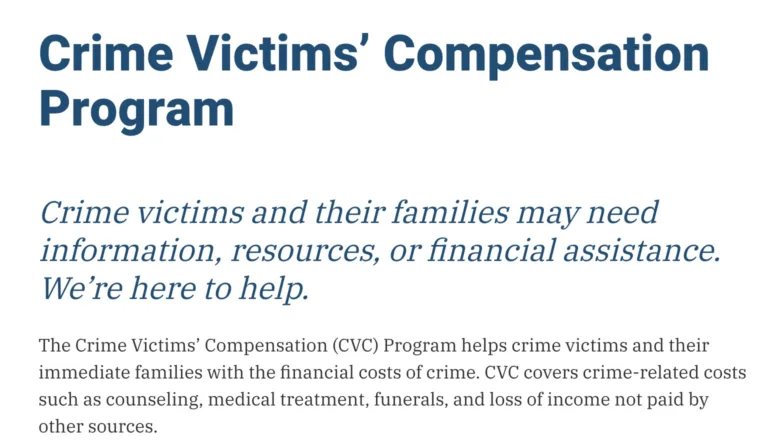 (281) 587-1111
(281) 587-1111  (281) 587-1111
(281) 587-1111 
There are many instances where serious injustice and crime occur, and the innocent victim is left holding the bag. This can happen when someone gets into an accident with a drunk driver and, for whatever reason, the driver is not covered by insurance. It can also occur in many other ways where the victim is not compensated or is adequately compensated for their injuries.
The Texas Crime Victims’ Compensation Fund allows innocent victims to collect necessary compensation in certain instances. The Attorney General of Texas runs the fund. Victims must seek help from other health insurance, Medicaid or Medicare, car insurance, or Worker’s Compensation.
The crime must have been reported to the appropriate law enforcement agency within a reasonable period and certainly within a time when the investigation or prosecution of the climb will not be hampered.
Generally, the application for benefits must be submitted within three years of the date of the crime. However, the filing date may be extended if good cause is shown for the victim’s age or physical or mental incapacity.
The victim must cooperate fully with the appropriate law enforcement agencies.
Article 56.32 provides the following individuals may qualify for benefits:
Crimes involve “criminally injurious conduct,” meaning conduct that occurs or is attempted or possesses a substantial threat of personal injury or death and is or would be punishable by fine, imprisonment, or death.
Sex offenses, kidnapping, aggravated robbery, assault, arson and homicide, and other violent crimes that cause physical or emotional harm qualify.
Additionally, if your motor vehicle-related crimes are covered, they include failure to stop and render aid, DWI, manslaughter, criminally negligent homicide, aggravated assault, intoxicated manslaughter, and intoxication assault.
Benefits are not available to those who participate in the crime knowingly or willingly, are an offender or accomplice of the offender, were incarcerated at the time of the crime, or knowingly or intentionally submit false information to the Attorney General.
Claims that are approved can receive compensation for crime-related expenses such as:
And additional benefits can be obtained for victims with total and permanent disabilities.
Claims may be approved for benefits up to a total of $50,000. These funds may be paid to the victim/claimant or service providers on behalf of the victim.
Medical Expense benefits related to the crime are calculated using statutory guidelines. Benefits may be paid for hospitals, doctors, ambulance services, prescriptions, dental work, nursing homes, and medical appliances such as wheelchairs and prosthetics.
Mental Health Care in outpatient therapy from a licensed provider is available for up to a $3,000 maximum. Approved in-patient hospital treatment is available for a maximum of 30 days at a rate of $600 per day. Approved residential treatment is available for $400 per day. Pre-authorization may be required for either benefit.
Lost Wages may be paid to a victim who cannot work due to physical or mental injuries related to the crime. Lost wages may also be awarded when a victim misses work to seek medical treatments for crime-related injuries or when the victim and/or claimant takes part in the criminal justice process (other than subpoenaed testimony). The award maximum is $500 per week.
Bereavement Leave is available to a deceased victim’s immediate family or household members.
Child/dependent care expenses may be covered as a new expense resulting from the crime. Pre-existing childcare costs are not reimbursable. Child care benefits for the dependent(s) of a surviving victim may be limited to a maximum of 90 days.
The award is paid at the actual cost of care, not to exceed $100 per week per dependent or minor child in a licensed daycare facility or provider.
Loss of Support benefits is available to dependents of homicide victims. The maximum benefit is $500 per week, calculated from the victim’s salary. Loss of support is also available to dependents of victims (usually in family violence cases) for 90 days.
Funeral and Burial Expenses include reimbursement for professional burial services, flowers, caskets, urns, and grave markers. The maximum award for these costs is $4,500. Costs for transporting the body to another state or country are awarded in addition to the $4,500 maximum.
The maximum available for approved benefits under the fund is $50,000. However, people with permanent disability because of a covered crime may qualify for an additional $75,000 and some additional expenses covered under the act.
You can apply for compensation by calling 1-800-983-9933 or downloading an application that can be filled out and mailed at the address provided. https://www.texasattorneygeneral.gov/files/cvs/cvcapplication.pdf
You can also email the office of the Attorney General here: crimevictims@texasattorneygeneral.gov. Or fill out the contact form on the state’s webpage.
While we do not handle crime victims’ fund claims, if you were injured in an accident in Houston by an insured driver and would like to discuss your rights and options, feel free to take advantage of a free consultation with our personal injury law firm in Houston, Texas.
Call (281) 587-1111.
6711 Cypress Creek Pkwy, Houston, TX, 77069
Related Posts:
What To Do If You Are Injured In A Company Car?
Texas Procedures for Injury Settlements that Involve Minors
Top 10 Insurance Company Tricks for Car Accident Victims in Houston
On the Job Injury in Texas-is it Worker’s Comp or a Personal Injury Case?
How Much to Expect from a Car Accident in Texas?
Houston Dram Shop Liability Lawyers
Suing Bars and Clubs for Over-serving
Can I Get Punitive Damages if I am Hurt by a Drunk Driver?
What is the legal alcohol limit in Texas?
NEED HELP? HAVE QUESTIONS?